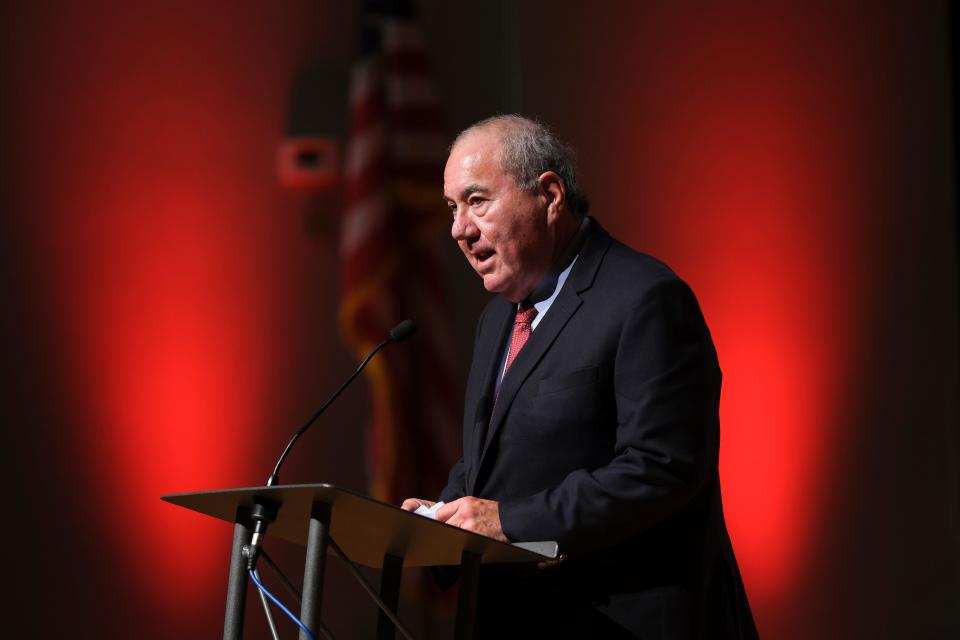Congress terminated Osage reservation in allotment era, Oklahoma court rules
Congress disestablished the Osage Nation’s northern Oklahoma reservation, the state’s highest criminal court ruled Thursday.
The closely watched decision means Oklahoma can continue to prosecute tribal citizens accused of committing crimes in Osage County, which Congress established as the Osage reservation in 1872.
The Oklahoma Court of Criminal Appeals ruled the reservation no longer exists, citing the precedent set by a 2010 federal appeals court ruling. As a result of that decision, the landmark U.S. Supreme Court ruling on tribal reservations in Oklahoma doesn’t apply to the Osage reservation, the five state appellate court judges ruled.
“We decline to revisit this issue and affirm the vitality” of the 2010 decision, Vice Presiding Judge Robert Hudson wrote in the opinion issued by the court.
More: This is the legacy of 'Killers of the Flower Moon' according to Osage people
McGirt decision does not conflict with earlier rulings on Osage Nation reservation
The ruling lands nearly four years after McGirt v. Oklahoma, the U.S. Supreme Court decision that found Congress had never disestablished the Muscogee Nation’s reservation in eastern Oklahoma. The ruling has since been applied to several other tribal reservations.
Only federal and tribal courts can try tribal citizens accused of crimes on reservations, a fact Gov. Kevin Stitt routinely criticizes as unfair to the state.
Questions surrounding the Osage Nation’s reservation have wound up in court before. The 10th Circuit Court of Appeals ruled in 2010 that Congress had disestablished the tribe’s reservation around the time of statehood, when federal lawmakers voted to divide up the tribe’s land into individual allotments.
The McGirt decision does not overrule the 10th Circuit ruling or conflict with it, the state appellate court concluded Thursday.
Geoffrey Standing Bear, the principal chief of the Osage Nation, and Clint Patterson, the attorney general of the Pawhuska-based tribe, could not be immediately reached to discuss the ruling. The Osage Nation's communications office issued a statement Friday calling the decision disappointing but not surprising, given past rulings by the Oklahoma Court of Criminal Appeals.
"Congress has never disestablished the Osage Nation Reservation, which the nation purchased using its own funds when it was forced by the United States to remove from a reservation in Kansas to a new reservation in Oklahoma," the statement said. "So, an injustice remains on the books today — for another court to fix."
Standing Bear told The Oklahoman after a lower court issued a similar decision in 2022 that he believed the U.S. Supreme Court would ultimately need to settle the debate.
“We would like to have our original reservation boundaries that we were promised in 1872,” Standing Bear said at the time. “We would like to have those recognized, and that’s what we’re seeking.”

Gentner Drummond, Oklahoma’s attorney general who also owns a sweeping ranch in Osage County, said in a statement that he was pleased with Thursday’s ruling and “believes the court made the appropriate decision.”
Mike Fisher, the district attorney for Osage and Pawnee counties, said he was grateful the appeals court affirmed the state’s power to prosecute all people accused of committing crimes in the area.
“We felt strongly the state still had jurisdiction within Osage County to be able to prosecute all cases involving all citizens,” Fisher said.
More: Lawmakers can renew tribal compacts over governor's objection, Oklahoma Supreme Court rules
Three other lawyers who were directly involved in the case did not return messages to talk about the ruling or any plans to ask the U.S. Supreme Court to take up the case.
Thursday’s ruling marked the first time the state’s highest criminal court has formally weighed in on the status of the Osage Nation reservation after McGirt. The court ruled in 2021 that Congress had also disestablished the reservation set up for the Kiowa, Comanche and Apache tribes in southwest Oklahoma.
Thursday’s ruling stemmed from an appeal filed by Dakoda McCauley, an Osage citizen who challenged the state’s right to prosecute him for a 2018 killing that occurred at his home in rural Osage County.
McCauley, 29, was convicted in 2022 of first-degree manslaughter in the death of Frankie Cotto, 33. McCauley believed Cotto had slept with McCauley’s girlfriend and stabbed Cotto after drinking with him, according to court filings. McCauley argued he acted in self-defense.
In addition to rejecting his argument that the state lacked jurisdiction to prosecute him, the Oklahoma Court of Criminal Appeals also rejected several other reasons McCauley said he should be granted a new trial.
He is serving his 22-year sentence at a state prison in Holdenville, records show.
Editor's note: This story has been updated to include comment from the Osage Nation's communications office.
Molly Young covers Indigenous affairs. Reach her at mollyyoung@gannett.com or 405-347-3534.
This article originally appeared on Oklahoman: Osage reservation no longer exists, Oklahoma appeals court rules

